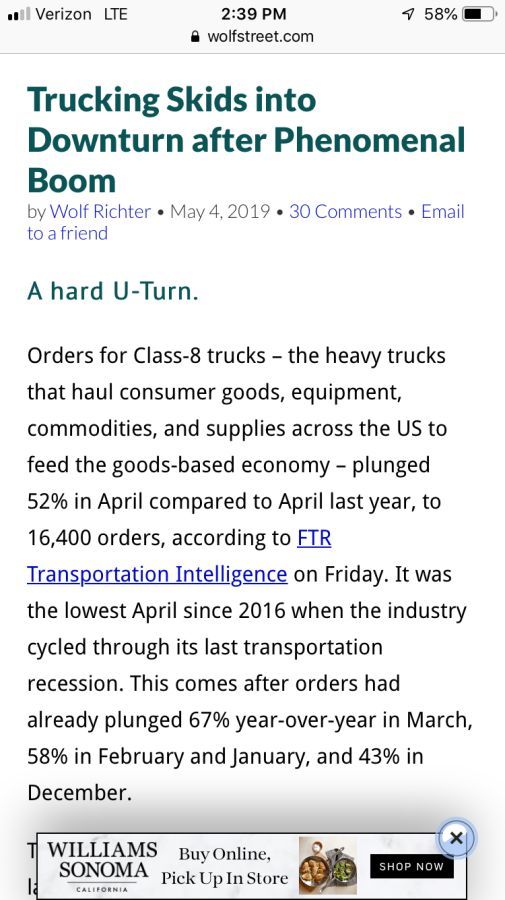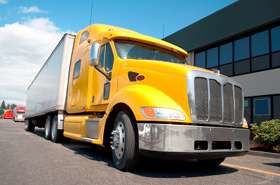Truck Orders
Topic 25477 | Page 1

Old Dominion bought 7 or 800 new trucks and spent a total of 160 million on new equipment for this year.
Personally i think companies are going to skip a year buying new trucks as most have upgraded their fleets last few years. Could be completely wrong but it is my theory
I do not see that article as all gloom and doom.
I do not see that article as all gloom and doom.
I don't know about the purchasing cycle of trucking companies, but I do agree with PackRat. Things are naturally cyclical in most businesses. When I go to my OC there are probably 100 new trucks just sitting in the lot. Many of them are there for their lease/operator program. All big businesses have multi-year plans and I'm sure many companies built up their inventories and are now ok with what they have in stock.
Part of the "business models" of larger companies - is that they have a "leasing company", as a separate entity. The LEASING COMPANY purchases the trucks from the dealers/manufacturers, and then leases them TO the carrier company (or lease op drivers).
It's a better write-off for the carrier to lease the units, and the leasing company writes down/amortizes the units, selling them off as they "age out" - strangely, many companies also have a separate "Truck Sales" company to handle the selling of the ages out units.
It's a paperwork shuffle, totally legal, and has a number of advantages from a tax & bookkeeping standpoint.
Since the "big boys" order 100's of units, up to a year or two out (to take advantage of bulk discounts), a "business decision" to hold off on new orders, can mean a drop or surge in manufacturing numbers.
This is probably unrelated to actual demand/capacity numbers, or even the somewhat illusionary "driver shortages" - which are more like "retention shortages", which have as much to do with the 100's of new drivers that are coming into the industry (many of which can't cut it and don't last) as the folks that jump ship (greener pastures syndrome) or companies that can't retain drivers due to pay or other considerations.
The new per diem tax rules are being used by companies to attract drivers (by paying the full day rate of per diem - also a tax advantage to the company), and companies that are paying a little more to outfit trucks with "amenities" (APU, fridge, TV's, etc.).
If companies that make huge orders (100's of units) have a month or two when they don't need deliveries, this can skew production numbers. Or - if they order a buttload of updated models (like the newer Cascadias), and are waiting until older models run up enough miles to phase out, before ordering replacements - this can also result in a downturn in production. Likewise, if the quality of the newer units allow companies to keep units on the road for another 50-100K miles
I would do the chicken little sky is falling routine on industry just yet. I think Prime even owns a piece of Freightliner (I know they practically own the SpringMo dealership, if not actually as a separate business unit).
There are a number of variables that could be responsible for the drop in production, and a month or two doesn't necessarily indicate a permanent trend.
Rick
Per Diem:
Getting paid per diem means getting a portion of your salary paid to you without taxes taken out. It's technically classified as a meal and expense reimbursement.
Truck drivers and others who travel for a living get large tax deductions for meal expenses. The Government set up per diem pay as a way to reimburse some of the taxes you pay with each paycheck instead of making you wait until tax filing season.
Getting per diem pay means a driver will get a larger paycheck each week but a smaller tax return at tax time.
We have a ton of information on our wiki page on per diem pay
APU:
Auxiliary Power Unit
On tractor trailers, and APU is a small diesel engine that powers a heat and air conditioning unit while charging the truck's main batteries at the same time. This allows the driver to remain comfortable in the cab and have access to electric power without running the main truck engine.
Having an APU helps save money in fuel costs and saves wear and tear on the main engine, though they tend to be expensive to install and maintain. Therefore only a very small percentage of the trucks on the road today come equipped with an APU.


I would not worry about that article. I have a freind that is a semi truck new order sales man. 2 years to 18 months ago the time from ordering a truck to delivery of a truck was 13 to 14 months. Now the time from order to delivery is 9 to 10 months. Just to look at the historical data 4 years ago the time was 3 months from order to delivery. So to think about it trucks that were order 18 months ago were delivered in Oct to Nov of last year just in time for the holiday shipping season. Now look at that most years the slow time for trucking is Jan, Feb, and some of March, so as a business you don't want to take delivery of an assist that will just be sitting around for a months.
I will start to worry when I see major company's start cancelling there orders or cutting them sharply. Right now there still taking delivery of there orders there just decreasing there orders for future truck orders.
Too funny. We were going with all freightliners but they're so backordered, they couldn't meet our needs so were starting to get in 2020 volvos instead.
Since the "big boys" order 100's of units, up to a year or two out
In the case of Knight/ Swift with over 20,000 Tractors that they "Lease" from "themselves", for approx 36 months. I would imagine their orders are in the 3-4 thousand range annually.
Our trucks are leased from ourselves.. (west side unlimited) too. It's quite common to do that. In my permit book I have documentation that it's a leased vehicle. My old truck was too.
Too funny. We were going with all freightliners but they're so backordered, they couldn't meet our needs so were starting to get in 2020 volvos instead.
That’s what our problem is. We should have had the 15’s phased out by now, but they’re so back ordered, we’ve still got guys in 14’s.
New Reply:
New! Check out our help videos for a better understanding of our forum features

















Preview:








 TT On Facebook
TT On Facebook